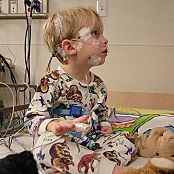So many aspiring nurses proclaim early on that they would like to work as a pediatric nurse. Pediatric nursing requires a tremendous amount of focus, critical thinking and finesse. Here are some things to consider if you want to become a pediatric nurse.
Therapeutic Communication
Pediatric nursing covers age ranges from newborn to eighteen years old. The Discover Nursing website has an in-depth look at nursing for a pediatric population. Knowing how to effectively communicate to toddlers and teenagers is important. Not only are you communicating to children and teenagers, you're also communicating to frantic adults that are often bewildered by the medical system. Verbal communication is only one aspect of therapeutic communication. Oftentimes, children pick up non-verbal cues which cause them to be wary of medical professionals. If you are the first medical professional a child comes in contact with, your behavior could dictate the perception of medical professionals for years to come.
Who You Care For
Caring for children is not limited to the child. In the hospital setting, your primary focus is on the child, but you are also providing emotional care and support to the family as well. You may have all sorts of parents watching your every move. There are parents that will want you to provide for their child's every need and there are parents that will want to be right by your side every step of every shift. Then there are the parents that never come to see their child and it will be up to you to be their caregiver, support team and confidant. Knowing how to effectively deal with the pediatric patient and the patient's parents is a large part of pediatric nursing.
Clinical Skills
Children's bodies are not the same as adult bodies. Tolerance for medication is much lower than adults and you can very easily overdose a child. Having top-notch clinical skills as it pertains to pediatric medicine is very important. In addition to clinical skills, your critical thinking has to be tops as well. When a child's condition deteriorates, it will deteriorate faster than an adult patient. You may only have moments to make decisions to save a patient's life.
Pediatric Patients Can and Will Die
It's important to know that pediatrics is not all band aids and lollipops. There are some pediatric patients that will die despite the miracles of modern medicine and the best efforts of the team. The sickest of the patients may lash out at their nurses and doctors. When this happens, it's important to remember that you're a professional and to not take it personally. Be kind, be supportive and use your communication skills to try to put them at ease.
Pediatric nursing can be a rewarding specialty. If you are prepared for the pitfalls that come with sick children, you could be a tremendous asset to a hospital or practice.
Photo Source: Wikimedia
[cf]skyword_tracking_tag[/cf]


